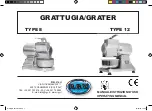
12
SIMMERING
Recommended temperature control probe
setting: SIMMER
•
Used for cooking casseroles, stews and
reducing and thickening sauces.
•
Simmering food is to cook food in liquid
between a temperature range of
85°C–96°C.
•
Bubbles should be small and just breaking
through the surface.
•
For best simmering results, the frypan
should have a minimum of 3 litres of
combined food and liquid.
•
Simmering can be achieved with and
without the lid on.
•
Follow cooking instructions as per recipe.
The frying pan will cycle on and off in
short bursts.
•
Food should be stirred occasionally to allow
food to be cooked evenly.
STEAMING
Recommended temperature control probe
setting: SIMMER-SAUTE
•
Steaming is the healthiest of cooking
techniques. It retains the food’s texture,
flavour, vitamins and minerals which may
otherwise be lost in the cooking water.
•
Steaming consists of cooking food by
setting it above a hot boiling liquid, and
letting the steam from the liquid literally
cook the food.
•
When steaming always make sure that the
water never comes in contact with the food.
•
Always line a plate or tray with baking
paper or cabbage leaves. This keeps the
food from sticking to the plate and coming
in contact with the water.
•
Always fill the frypan with a minimum of
1-2 litres of water.
•
Do not allow the frypan to boil dry.
•
Check water levels during cooking and refill
with boiling water to prevent frypan from
boiling dry.
•
To steam; fill the frypan with cold water.
Set temperature probe to SEAR and place
wire rack into the base.
•
Line a plate with baking paper or cabbage
leaves and place food on top. Position plate
or tray onto wire rack and cover with lid.
•
Bring water to the boil and reduce to
SIMMER-SAUTE.
•
Be careful when dealing with steam.
When lifting the lid, steam can scald
and burn.
Summary of Contents for Thermal Pro BEF560
Page 1: ...the Thermal Pro Stainless Instruction Book BEF560 ...
Page 13: ...13 Notes ...
Page 14: ...14 Notes ...
Page 15: ...15 Notes ...


































